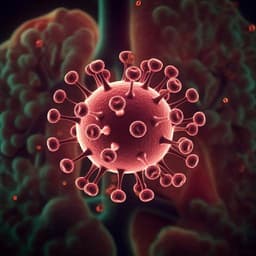
Medicine and Health
Modular micro-PCR system for the onsite rapid diagnosis of COVID-19
P. Q. M. Nguyen, M. Wang, et al.
Since its emergence in December 2019, severe acute respiratory syndrome coronavirus 2 (SARS-CoV-2) has been spreading worldwide, causing deaths, illness, and disruption to lives and businesses.
Effective control of the COVID-19 pandemic requires rapid and accurate detection of the virus. The initial publication of the SARS-CoV-2 genome in January 2020 enabled companies and laboratories worldwide to develop various assays and techniques for COVID-19 diagnosis¹–³. Real-time reverse transcription–polymerase chain reaction (RT–PCR) remains the gold standard for the identification of SARS-CoV-2. As a comprehensive testing program would likely require both widely accessible and rapid screening in combination with highly sensitive PCR confirmatory tests, there is a need for alternative methods to identify infected individuals that are sufficiently low cost, portable and effective to enable rapid diagnosis at the point of use. These point-of-care (POC) tests are an important tool to be deployed at borders for opening up international travel and economies.
Various commercial lab-based and POC tests have been deployed globally: Cepheid® Xpert® Xpress SARS-CoV-2⁴, Roche’s cobas® SARS-CoV-2⁵, GenMark ePlex® SARS-CoV-2⁶, DnaNudge's COVIDNudge test⁷, Abbott ID NOW COVID-19⁸, and others⁹. The first three are fully automated systems for multiple sampling testing with high sensitivity, e.g., it was reported that Xpert® Xpress achieved 98.3% sensitivity in their 46-minute POC test¹⁰. However, the equipment is expensive and has a large footprint, which constrains scale-up testing and uses in
low-resource settings. COVIDNudge is a lab-free RT–PCR platform that can detect seven viral targets (RdRp1, RdRp2, E-gene, N-gene, N1, N2, and N3) and one control (Ribonuclease P), with 94% sensitivity in a 90-min test¹. However, the excessive number of wells required for one sample (72 wells) increases operational complexity and makes the test prone to handling and interpretation errors. FDA-approved POC tests employ isothermal amplification, such as Abbott ID Now COVID-19, can detect positive samples in as little as 5 min and negative results in 13 min using a small portable device¹². Although this approach can obtain quick results, there have been reports of limited test accuracy and sensitivity¹¹³.
The use of microfluidics for diagnostic testing, particularly in a POC setting, is advantageous because it enables testing using a minute amount of sample, potentially enabling quicker detection and deployment with fewer reagents¹⁴. There have been numerous developments in microfluidic PCR systems¹⁵. Some devices provide multiple on-chip functions for sample preparation and detection. However, these systems are not modular and still have challenges to overcome for integrating the necessary MOTS PCR chips made of glass, PDMS, or other materials to ensure temperature control within the microfluidic channel¹⁶. To overcome this limitation, probes can be moved to regions on the chip that are preheated to the desired temperature for PCR. This has achieved either by using a flow-through system with multiple preheated zones¹⁷⁻¹⁸ or by cycling reagents between preheated zones¹⁶. However, these methods require high-precision programmable syringe pumps that make the system bulky and unservable for POC settings. Furthermore, cumulative heating increases chip complexity, which poses a challenge for mass production. This issue is amplified if multiple reaction chambers (for example, to accommodate negative, positive, and internal controls) are needed on a chip. Microfluidics also enables the use of minute volumes, which reduces the volume of reagents needed. This is especially important in a pandemic that disrupts the supply chain of testing reagents. A microfluidic lab-ondemand system has been demonstrated to be able to perform PCR on samples with volumes in the nanoliter range, down to 30 nL¹⁹²⁰. Although a small volume could reduce reagent use, too low a volume would adversely affect the sensitivity of the test. This is more pronounced when attempting to detect asymptomatic cases in which the input sample has a very low titer of virus. These nanoliter-range chips cannot be scaled up to microliters due to their system design. In addition to PCR, portable lab-on-chip systems have been used to perform reverse transcriptionloop mediated isothermal amplification (RT-LAMP) for diagnostic testing²¹²⁶. These systems cannot perform PCR due to their simplified thermal control units. Most cannot measure the dynamics of the reaction and capture only the end results. Furthermore, RT-LAMP has lower sensitivity than RT–PCR for COVID-19 detection¹¹⁷²⁸.
We developed a cost-effective patent-pending modular microfluidic RT–PCR and RT-LAMP platform, Epidax²⁹, for the rapid onsite diagnosis of SARS-CoV-2. This LEGO-like platform includes an on-chip temperature module, a detection module and analysis software and can be easily reconfigured to perform either COVID-19 screening by endpoint RT–PCR or RT-LAMP tests conformably tested by real-time RT–PCR (RT-qPCR). We established its performance in detecting SARS-CoV-2 viruses from 43 clinical RNA extracts using our endpoint RT–PCR and RT-qPCR configured assays, respectively, to be comparable to the results obtained using a commercial system, but with half the amount of reagents used. In addition, we demonstrated rapid direct RT–PCR detection of SARS-CoV-2 viruses in 42 nasopharyngeal swab samples without RNA extraction, which reduced the sample-to-result testing time to an hour. Finally, we performed SARS-CoV-2 detection in 16 clinical RNA extracts using our reconfugured RT-LAMP clearing systems.
Materials and methods
The Epidax™ system comprises a temperature module, a microfluidic chip, a detection module, and image processing and analysis software (see Fig. 1a–c). The chip can be easily mounted onto the temperature module and self-aligned by using magnets. The temperature of the sample in the chip is controlled over a period of time to enable an amplification reaction. The detection module comprises a CMOS camera to capture fluorescent images of the chip at defined time points (i.e., at start and end cycles for endpoint PCR or at the end of each amplification cycle for real-time PCR). The image processing and analysis software then analyzes the images taken. The reactions are quantified by the fluorescence intensity of the samples. The modularity of the platform offers flexibility in creating detection platforms for different sample types, detection targets, protocols, and deployment requirements. Here, we successfully employed Epidax™ for various applications: COVID-19 screening by using endpoint RT–PCR or RT-LAMP, a confirmatory test using realtime RT–PCR on RNA extracts, and a screening or confirmation test using a direct RT–PCR assay on nasopharyngeal samples without RNA extraction.
On-chip temperature module
The on-chip temperature module consists of the microfluidic chip, a Peltier element assembled with a
Nguyen et al. Microsystems & Nanoengineering (2022) 8:82 Page 3 of 12
[Figure 1 description omitted]
spacer plate and a support plate (see Fig. 1d). Magnets are used for self-aligned assembly of the chip onto the thermal module, enabling quick changes of testing samples. Only the chip is disposable, whereas the entire module is reusable, which reduces the operating cost of the system.
The chip comprises a main channel plate and a thin aluminum adhesive film serving as a thermally conductive layer and enhancing the fluorescent signal collected by the detection module. Aluminum has a thermal conductivity of 200–237 W/mK, which is a few orders of magnitude higher than those of glass, PDMS, and plastic (generally less than 2 W/mK), which are traditionally used to fabricate microchannels. The low thickness and high thermal conductivity enable a high rate of heat transfer into and out of the microchannel. This is very important, as some PCR protocols require fast temperature cycling. By using the reflective aluminum film, light emitted by fluorescent samples will be reflected back up to the detection module, increasing the signal that can be collected compared to that obtained with a transparent well (see Fig. S1 for the comparison of fluorescence intensity with different substrate materials, such as transparent glass and plastic).
The excellent thermal and optical characteristics of the chip allow various applications, including both RT–PCR (cyclic thermal control) and RT–LAMP (isothermal control), for which the use of traditional plastic or PDMS chips with transparent walls is suboptimal.
The channel plate was fabricated using polymethyl methacrylate (PMMA) with dimensions of 50 mm × 40 mm (L × W). A sensor slot and holes for magnets were cut through using a CO2 laser (Universal Laser Systems). The temperature sensor used was MP-3716 (TE Technology, Inc.). The number of microchannels on the channel plate could be easily adjusted for various testing needs. Here, we demonstrate four of six microchannels on one chip, each used as an independent chamber, enabling multiple sample testing. For RT–PCR experiments, four identical channel profiles (see Fig. 1e) were engraved using a CO2 laser (Universal Laser Systems) to a depth of ~720 µm, and the total volume of each channel was ~60 µL. For RT–LAMP experiments, six-channel profiles (see Fig. 1f) were engraved to a depth of ~1.71 mm, giving a total channel volume of ~98 µL. Each channel consists of serpentine regions acting as flow mixers and a eye-shaped chamber in which the reaction mix will be reside. During PCR, the temperature profile will allow for different temperature programming to diffuse the liquid sample. The serpentine region acts as a mixer to enable the same sample-reagent mixing before entering into the microchannel. The eye-shaped chamber, with its curvature along with the presence of oil, prevents the sample from breaking up into smaller portions under thermal cycling conditions. Additionally, the small reservoir at each inlet and outlet acts as a chamber to contain fluid (oil, etc.) that might flow out from the channel due to the vapor pressure caused by high temperatures. These designs can be easily customized by varying the depth and width of the channels to adapt to different volumes. Here, we use half of a standard PCR volume, which is 10–12.5 µL, for the on-chip detection of SARS-CoV-2.
The channel plate was soaked in RNase Away (Thermo Fisher), followed by thorough washing in nuclease-free water and air drying in a clean hood. An aluminum adhesive film with a thickness of 36 µm (Excel Scientific) was used as the conductive film and secured to the channel plate by manual application. The spacer was produced by laser cutting of PMMA. The support plate was machined by using copper material. The Peltier device was placed within the spacer, backed by the support plate. An optional layer of thermal pad (such as MX-4, Arctic) was applied to the contact surface between the chip and the Peltier device and the heating to enhance heat transfer.
Detection module
The detection module comprises a roof for receiving the chip, a CMOS camera (Arducam OV5642) and an LED light source (see Fig. S1). It has dimensions of 110 mm × 60 mm × 90 mm and weighed ~250 g. The camera arrangement has a large field of view of 40 mm, which is larger than the sample area thus signals from all reaction channels can be captured simultaneously without mechanical movement of the light source and detection system, as in other commercial systems. This advantageously decreases the total detection time and thus the overall test time. The detection module further comprises a filter cube (including a dichroic mirror, an excitation filter, and an emission filter). The casing of the detector module is 3D printed with designated slots for the LEDs, filter cube, chip and camera using polylactic acid. For the FAM signal, LED light with a 492 nm peak wavelength, an excitation filter (446–486 nm), and an emission filter (cutoff at 520 nm) were used. For direct RT–PCR tests, two additional detection modules to detect the HEX signal (excitation peak at 538 nm, emission peak at 555 nm) and Texas Red signal (excitation peak at 596 nm, emission peak at 613 nm) were fabricated.
Additionally, we developed software for Epidax to process the images taken by the detection module for real-time or endpoint detection. The in-house package can be run as a daemon for RT–qPCR experiments (for confirmatory SARS-CoV-2). As new images are captured at the end of each cycle, they are run through the procedure in Fig. S2a to generate the amplification plot and determine the Ct value. The ability to obtain these metrics nearly in real time is important in POC diagnostics, as it provides flexibility to hasten the time from sample to result. For example, there may be a clinical need to correlate Ct values to the presence of infectious virus (i.e., at the Ct of 20), and higher Ct values may indicate prolonged viral RNA shedding by a noninfectious individual. If the testing scenario requires a positive diagnosis only for infectious patients, the test run can be programmed to stop when the detection threshold level is reached before cycle 20 or at a predetermined higher Ct value. This greatly enhances the detection efficiency.
This analysis package can also be run as a web application for pandemic RT–PCR (for COVID-19 screening) providing quick screening for SARS-CoV-2, where the dynamics of the amplification are not of interest. In this mode, one image is obtained before an amplification reaction (Cycle 0) and compared with one image after a number of amplification cycles (e.g., Cycle 45). The intensity difference between these images (after processing as shown in Fig. S2e) can be used to conclude that the
- Epidax®, a modular microfluidic platform, supports endpoint RT-PCR, real-time RT-qPCR, and RT-LAMP for SARS-CoV-2 detection and confirmation at the point of care while using half the standard PCR reagent volume (10–12.5 µL on-chip).
- Sensitivity: detects as little as 1 RNA copy per µL for both real-time and endpoint RT-PCR.
- Clinical performance: produced results comparable to a commercial platform when testing 81 clinical RNA extracts.
- Direct testing without RNA extraction: accurately detected SARS-CoV-2 from 44 nasopharyngeal samples using a direct RT-PCR assay, reducing sample-to-answer time to approximately 1 hour with minimal user steps.
- RT-LAMP validation: technology validated using an RT-LAMP assay on 54 clinical RNA extracts.
- System features: compact detection module (~250 g) capturing all channels simultaneously; aluminum-backed microfluidic chip improves thermal transfer and fluorescence signal, enabling rapid, sensitive testing suitable for low-resource settings.
The study addresses the need for rapid, accurate, and accessible SARS-CoV-2 diagnostics by introducing a modular microfluidic platform that combines high analytical sensitivity with reduced reagent usage and operational simplicity. By achieving detection down to 1 RNA copy per µL and demonstrating performance on clinical samples comparable to commercial systems, the platform meets confirmatory testing requirements while lowering cost and footprint. The ability to run endpoint RT-PCR or RT-LAMP for screening and real-time RT-qPCR for confirmation on the same hardware enhances deployment flexibility across diverse testing scenarios. Direct RT-PCR from nasopharyngeal swabs eliminates RNA extraction, shortening turnaround to about an hour and reducing user steps, which is critical for point-of-care workflows and surge capacity in low-resource settings. The design choices—aluminum-backed chip for superior thermal conduction and fluorescence, multi-channel layouts, and a wide field-of-view detector—streamline operation and reduce time-to-result, increasing practical utility compared to bulkier or more complex systems described in prior work.
This work presents Epidax®, a cost-effective, modular microfluidic platform capable of endpoint RT-PCR, real-time RT-qPCR, and RT-LAMP for SARS-CoV-2 detection at the point of care. The system achieves high sensitivity (down to 1 RNA copy per µL), comparable clinical performance to commercial platforms, reduced reagent consumption, and rapid time-to-result via direct RT-PCR without RNA extraction. Its thermal and optical design, compact detection module, and integrated analysis software support flexible screening and confirmatory workflows suitable for low-resource environments. Future work could include larger clinical validations across diverse settings, integration of multiplexed targets and internal controls, closed-cartridge sample preparation, and expansion to panels for other respiratory pathogens and emerging infectious diseases.
Limitations were not explicitly detailed in the provided text. Full limitations may include the need for broader clinical validation, operational verification across varied environments, and comparative assessments for RT-LAMP sensitivity versus RT-PCR.
Related Publications
Explore these studies to deepen your understanding of the subject.







